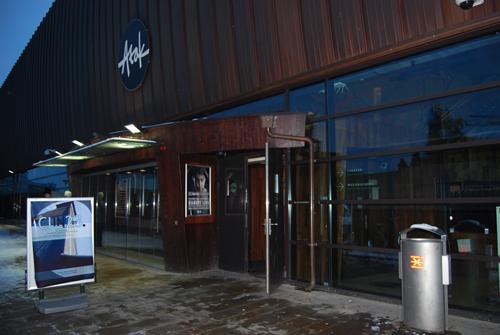
Poppodium Atak
Table of Contents
Editorial
In this issue, Anton Nijholt and Mariët Theune report on the 23rd
conference on Computational Linguistics in The Netherlands (CLIN),
Chris Biemann reports on the International Conference of the German
Society for Computational Linguistics and Language Technology (GSCL),
Alberto Lavelli and Octavian Popescu report on the Joint Symposium on
Semantic Processing Textual Inference and Structures in Corpora, Janne
Bondi Johannessen, Kristin Hagen, and Stephan Oepen report on The 19th
Nordic Conference of Computational Linguistics (NODALIDA 2013),
Alberto Díaz Esteban reports on The 29th edition of the Annual
Conference of the Spanish Society for Natural Language Processing
(SEPLN 2013), and Emmanuel Morin and Florian Boudin report on The 20th
Conference on Natural Language Processing (TALN 2013).
Vivi Nastase and Stephen Clark, editors
23rd conference on Computational Linguistics in The Netherlands (CLIN)
January 18, 2013
Entschede, The Netherlands
On Friday 18 January 2013, the 23rd meeting of Computational Linguistics in the Netherlands (CLIN 2013) took place in Enschede, The Netherlands. The location of the meeting was slightly unusual: Poppodium Atak in the Music Quarter of Enschede, with sessions taking place in (among other places) the concert halls, the café and the theatre hall. Many participants commented that they appreciated the special venue.

Poppodium Atak
The CLIN conference is mainly aimed at The Netherlands and Flanders (the Dutch language region of Belgium), but among the 125+ participants of CLIN 2013 many other countries were represented, ranging from nearby Germany to far away China, Russia and USA.
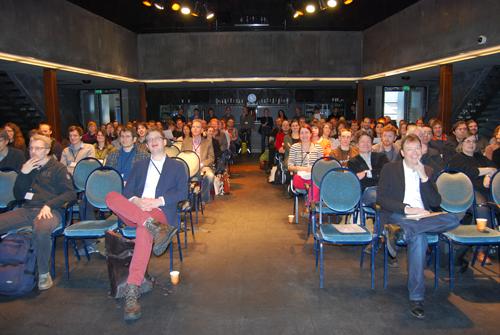
Audience in the big concert hall
More than 90 abstracts were submitted for CLIN 2013, leading to an extensive programme featuring 59 oral presentations (presented in 5 parallel sessions) and 19 poster presentations (including 4 software demonstrations) on a wide variety of topics in computational linguistics.
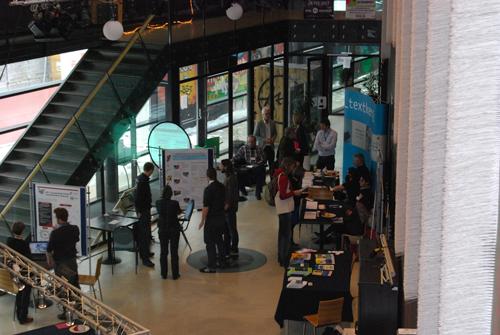
Foyer
Fitting with the tradition of CLIN as having a low threshold for starting researchers, we were pleased to have many presentations by graduate and undergraduate students. The STIL Thesis Prize for the best MA thesis in computational linguistics or its applications was awarded to Phong Le (University of Amsterdam) for his thesis on Learning Semantic Parsing.
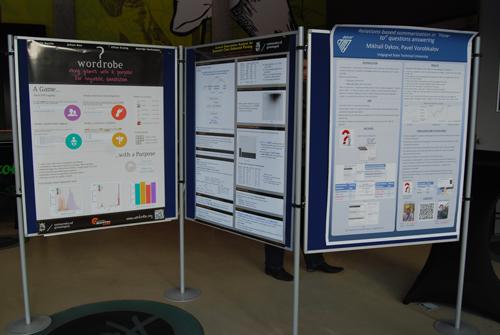
Posters
The invited speaker was Candy Sidner from Worcester Polytechnic Institute, USA. In her talk titled Creating a Real-Time Conversation Manager with Multiple Time Scales she presented her research on conversational agents capable of building long-term relationships with people.
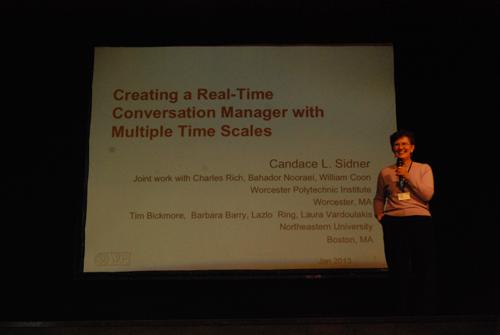
Invited speaker Candy Sidner
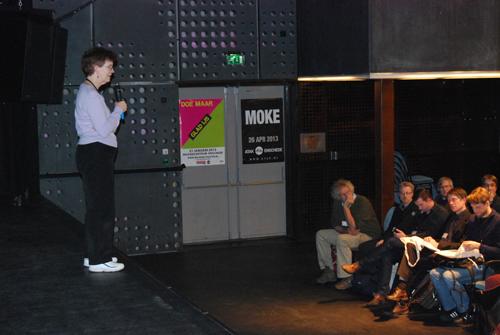
Candy Sidner: "I feel like a rock star!"
There was also a plenary talk from CLARIN-NL, a large project in the Netherlands that aims to make a significant contribution to the European CLARIN infrastructure; a research infrastructure for humanities researchers that work with language data and tools.
A new track introduced at CLIN 2013 was the Industry Track, which had eight talks on a large variety of language technology research in industry. It may have been a factor in attracting industry attention to CLIN 2013: among the participants were representatives from 12 different companies.
The full programme of the event can be found on the CLIN 2013 website
All in all, we look back on a very successful and inspiring conference. All authors of accepted abstracts were invited to submit a full version of their paper to volume 3 of the CLIN journal. A selection of the 20 submitted papers will be published by the end of 2013.
Anton Nijholt and Mariët Theune
General chairs
International Conference of the German Society for Computational Linguistics and Language Technology (GSCL)
September 23-27, 2013
Darmstadt, Germany
The International Conference of the German Society for Computational Linguistics and Language Technology (GSCL 2013) was held in Darmstadt, Germany, from September 23 to 27, 2013. The General Chair was Iryna Gurevych, Program Co-chairs were Chris Biemann and Torsten Zesch, the workshop chair was Györgi Szarvas, and local arrangements were coordinated by Christian M. Meyer and Wolfgang Stille.
GSCL 2013 received 43 submissions for the main paper track, out of which 26 were selected for publication. 12 papers were presented orally, 10 as posters, and 4 as demos. In addition, we had 18 abstract submissions to the Kaleidoscope track, which were presented as posters, short talks and demos. The papers were selected by a program committee of 52 reviewers. Each submission received three reviews, upon which the program co-chairs decided upon acceptance.
In addition to the main conference program, GSCL 2013 featured 4 workshops and 5 tutorials. Registration included participation in workshops and tutorials, and a total of 205 participants attended the event.
GSCL 2013 had three invited speakers: Hans Uszkoreit gave a talk on Big Data and Text Analytics, Massimiliano Ciaramita discussed Distributed Wikipedia LDA, and Rada Mihalcea presented her work on Multimodal Sentiment Analysis.
The prize for the best BA/MA Thesis in computational linguistics in German-speaking countries was awarded to Marcel Bollmann (Ruhr-Universität Bochum), as determined by a committee of GSCL executives.
Burghard Rieger received the honorary membership award of the German Society for Computational Linguistics and Language Technology.
Overall, GSCL 2013 was a great success, featuring an exciting scientific program with much discussion and interaction between participants, and a social event in a relaxed atmosphere.
The conference proceedings are available in print and online editions from Springer, see GSCL 2013's homepage for details.
Chris Biemann
Program co-chair
Technische Universitat Darmstadt
Joint Symposium on Semantic Processing
Textual Inference and Structures in Corpora
November 20-22, 2013
FBK, Trento, Italy
The Joint Symposium on Semantic Processing. Textual Inference and Structures in Corpora was held in Trento on November 20-22, 2013. The Symposium was a joint event supported by the EU-funded project EXCITEMENT, which aims to set up a generic architecture and a comprehensive open-source platform for multilingual textual inference, and by the B-CROCE project, which is the beneficiary of a Marie Curie Integration grant dedicated to finding regular structures as patterns in corpora.
The symposium benefited from the participation of a large number of keynote presentations by people whose research has had a significant impact on semantic processing.
The event was endorsed by the ACL Special Interest Groups SIGLEX and SIGSEM and its proceedings are publicly available in the ACL Anthology (JSSP proceedings).
The program consisted of:
KEYNOTE TALKS
The audience was more than 80 registered participants, from all over the world.
Alberto Lavelli
Octavian Popescu
FBK-irst, Trento
On behalf of JSSP-2013 co-organizers Ido Dagan, Elisabetta Jezek,
Alberto Lavelli, Bernardo Magnini, Guenter Neumann, Sebastian Pado
The 19th Nordic Conference of Computational Linguistics
May 22-24, 2013
University of Oslo, Oslo, Norway
NODALIDA 2013 (The 19th Nordic Conference of Computational Linguistics) was held 22 - 24 May 2011 in Oslo, Norway, on the campus of the University of Oslo.
The conference has been held every two years in various northern European universities since 1977, and this was the first time the conference was arranged in Oslo. NODALIDA is arranged by NEALT - Northern European Association for Language Technology. The conference attracts researchers and language technologists from universities in many countries in Northern Europe: Norway, Sweden, Denmark, Finland, Iceland, Greenland, Faroe Islands, Lithuania, Latvia, Estonia and northwest Russia. The main theme is language technology in many different forms such as speech recognition and speech synthesis, tagging and parsing, language modelling, machine learning for natural language, machine translation and more.
Although there are international language technology conferences, NODALIDA is especially important for the participating countries because it brings together participants from small northern European language communities with common challenges compared to worldwide speaking communities like English or Spanish. At the same time, NODALIDA has a good reputation around the world, and also attracts researchers from other places than northern Europe.
NODALIDA 2013 registered 141 participants including 3 invited speakers. The main conference was held Thursday and Friday, May 23 and 24. See the conference homepage and programme at the conference website. Thursday evening a Special Session on HPC for NLP was arranged.
The conference received 60 submissions from all over Europe, including one each from Mexico and the US. 38 were presented at the conference: 12 as oral presentations, 20 as posters and demonstrations/lightening talks, and 6 as student oral presentations. All submissions were reviewed by at least three experts in the field (two for demonstration papers), and the final selection was made by the Programme Committee.
The main conference had three invited plenary presentations by key figures in speech and language technologies:
84 participants were registered for 4 workshops on the Wednesday preceding the main conference:
Each workshop had its own set of organizers and programme committee. The programmes and other information on the workshops can be found on the NODALIDA workshops page.
The conference dinner was arranged at Restaurant Argent at the spectacular Oslo Opera House on Wednesday, May 22. After aperitifs in the Opera foyer, the participants were guided to Scene 2 and a small opera concert before dinner. Thursday, May 23, the participants were invited to a guided tour and a reception with a standing buffet at the beautiful Oslo City Hall.
The conference was sponsored by the following companies and projects: The Research Council of Norway (main sponsor), Lingit, Max Manus, INESS, WeSearch, Letterstedtska föreningen and the NEALT-sponsors.
The proceedings for the main conference and for all workshops are published by Linköping University Electronic Press, through the volume Linköping Electronic Conference Proceedings #85
Janne Bondi Johannessen
Local Chair
Kristin Hagen
Local Vice Chair
Stephan Oepen
Programme Chair
The 29th edition of the Annual Conference of the Spanish
Society for Natural Language Processing
September 18-20, 2013
Universitat Complutense de Madrid, Spain
The 29th edition of the Annual Conference of the Spanish Society for Natural Language Processing (SEPLN) took place in the Universidad Complutense de Madrid (Spain), on September 18, 19 and 20, 2013. It was co-located with the Spanish multi-Conference on Informatics CEDI 2013. The President of the Scientific Committee was Alberto Díaz and the President of the Organizing Committee was Luis Hernández.
The main goal of this annual conference is to be a forum for the presentation of the latest research and development in Natural Language Processing by the scientific community and the industry. It also aims to showcase actual applications and to introduce new R&D projects in the field. As in previous editions, the conference intends to identify future trends for basic research and applications as foreseen by professionals, in order to contrast them with actual market needs. Finally, the conference expects to be an enabling framework to introduce new people with an interest in this area of knowledge.
SEPLN 2013 received 53 submissions, out of which 45 were submitted as long papers and 8 as short papers (3 demonstrations and 5 ongoing R&D projects). The conference accepted 30 papers (acceptance rate of 49%), which were presented as either oral presentations (22 papers) or posters (8 papers). The papers were selected by a Program Committee of 35 reviewers from Europe, Mexico and Cuba. The reviewing process was a two-round review and the submitted papers were subjected to a blind review by at least three members of the Scientific Committee. A selection of the presented papers was published in the issue 51 of the journal Procesamiento del Lenguaje Natural (ISSN: 1135-5948, ISSN: 1989-7553), which is publicly available at the SEPLN site.
There were two keynote speakers at the conference:
The main conference was followed by two co-located workshops:
SEPLN 2013 had 62 participants.
Alberto Díaz Esteban
Universidad Complutense de Madrid, Spain
President of the Scientific Committee for SEPLN 2013
The 20th Conference on Natural Language Processing
July 17-21, 2013
Les Sables d'Olonne, France
The 20th conférence du Traitement Automatique du Langage Naturel (conference on Natural Language Processing) was held in Les Sables d’Olonne, France. TALN 2013 was organized by the Laboratoire d’Informatique de Nantes Atlantique (LINA) and the Laboratoire d’Informatique de l’Université du Maine (LIUM), under the auspices of the ATALA (Association pour le Traitement Automatique des LAngues). It has been held jointly with the conference for junior researchers RECITAL 2013 and followed by four workshops: MIXEUR, SemDis 2013, TALaRE 2013 and DEFT 2013.
TALN 2013 received 140 submissions, out of which 74 were submitted as long papers, and 57 were submitted as short papers. 36 long articles (48.6%) and 35 short papers (61.4%) were accepted for publication. RECITAL 2013, the conference for junior researchers in NLP, received 25 submissions, out of which 6 were accepted as oral presentations and 12 as posters. The programme was complemented with a demo session and two invited speakers: Josiane Mothe (IRIT, Université de Toulouse) and Alexander Fraser (Institute for Natural Language Processing, University of Stuttgart).
The conference traditionally ended with the general assembly of the ATALA and the best papers award ceremony. The ATALA TALN best paper award went to Olivier Ferret for the paper Sélection non supervisée de relations sémantiques pour améliorer un thésaurus distributionnel and Chloé Braud and Pascal Denis for the paper Identification automatique des relations discursives "implicites" à partir de données annotées et de corpus bruts. The ATALA RECITAL best student paper award went to Zhen Wang for her paper Une approche mixte morpho-syntaxique et statistique pour la reconnaissance d'entités nommées en langue chinoise.
Emmanuel Morin & Florian Boudin
Université de Nantes, France